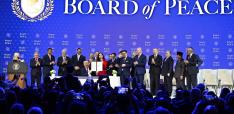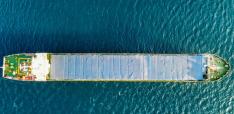Between G7 Leaders and the General Public: Is the Media being Held at Arm’s Length?
This post represents the fifth in a series from the ongoing G7 summit being covered on the ground by the Global Leadership Initiative's team. Please check in regularly to keep up to date with the latest news and analysis from the summit.
Media Centre – G7 Summit. The official location of the G7 Summit is Schloss Elmau. However, this location is only for the high-level discussions between the leaders. In general, only a select few of handpicked media personnel who have a ‘Special Pass’ can attend press briefings and ask pressing questions of G7 leaders. The rest of the media are located 20 km away in the Olympic Ice Sports Centre in Garmisch-Partenkirchen.
Unlike many G7/G8 summits in the past, there will be no press briefings or conferences held in this location by the various G7 leaders, hence no opportunity for a wider audience of policy analysts and journalists to ask questions about specific policy areas. While there is definitely an argument to be made about assuring the security of G7 leaders (peaceful protests at G7), it is also safe to say that by not engaging with the media at the G7 Media Centre, the media and the public good it provides the general public is also being kept at an arm’s length.
Previous G7/G8 summits have offered conscientious engagement with the press and ensured that many of the G7 leaders gave press conferences at the end of the second day of deliberations. These have often been held in the International Media Centre itself, in order to allow maximum access for journalists and, ultimately, a high level of transparency via Q & A sessions between leaders and the press. In the absence of those provisions at the Schloss Elmau summit, those of us here cannot help but wonder what motivations are behind the rationale to hold the media (and the few policy analysts and NGOs here) at such a distance.
Angela Merkel has been publically committed to ensure dialogue and responsive engagement between global leadership and civil society organizations. The Media Centre here in Garmisch-Partenkirchen is playing host not just to print, auditory and visual media, but also to a variety of NGOs, such as Médecins Sans Frontières, Save the Children and Oxfam, in addition to a minimal number of policy researchers like our own GLI team. Collectively, we represent the interests of a vast portion of the world’s population, many of whose lives may be significantly affected by the decisions being made, behind closed doors, by a handful of leaders, sherpas and invited guests. The G7 actively and repeatedly espouse the value of democratic principles, and yet the organisational set-up of the summit indicate a clear divide between the leaders and those in the Media Centre aimed to act as a conduit between the G7 and the general public.
In addition to the physical distancing of the Media Centre from the summit itself, our access to reliable Internet has been disheartening. Yesterday in particular, we were left without connection for around two hours, exactly at the moment that many journalists and analysts were fighting to stream and distribute large files to their editors before deadlines. When the connection was fixed, some journalists sarcastically tweeted their frustration. Despite light-hearted the reaction, one cannot help but feel that it is a major oversight of the organisers not to provide sufficient internet access for so many journalists.
There are many commendable aspects of Germany’s organization of the G7, in relation to food provision, ‘G7 Germany’ branded trinckets (i.e. mugs, T-shirt, pins, pens, notepads, caps, etc), effective security personnel, access to facilities and to other professional needs. Nevertheless, there is a yearning to be more involved, and to hold G7 leaders to account through reasonable engagement.
Yet now, in our own Media Centre, we are eagerly awaiting for the press conferences which we’re watching on a screen, with our headsets plugged in, and our fingers ready to type up the long-awaited Leaders’ Declaration of the 2015 Schloss Elmau G7 summit.
The G7 team: Garrett Wallace Brown, Hugo Dobson, Mihaela Gruia, Dominik Hatiar, Lucy Pedrick and Greg Stiles – Global Leadership Initiative, University of Sheffield. For more information on the Global Leadership Initiative and to keep up to date please click here.


